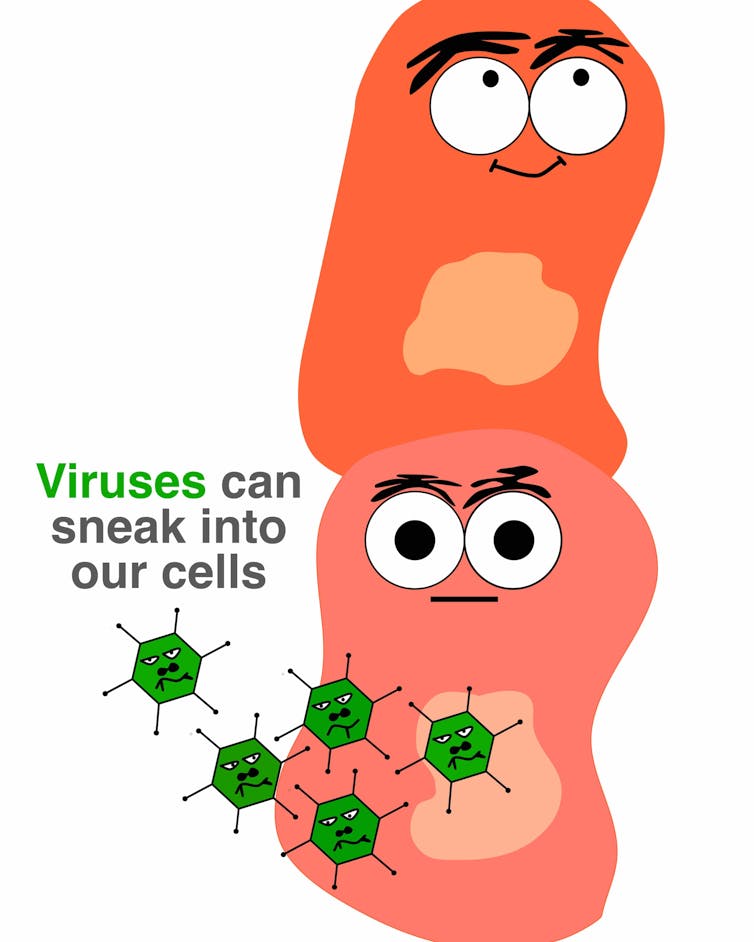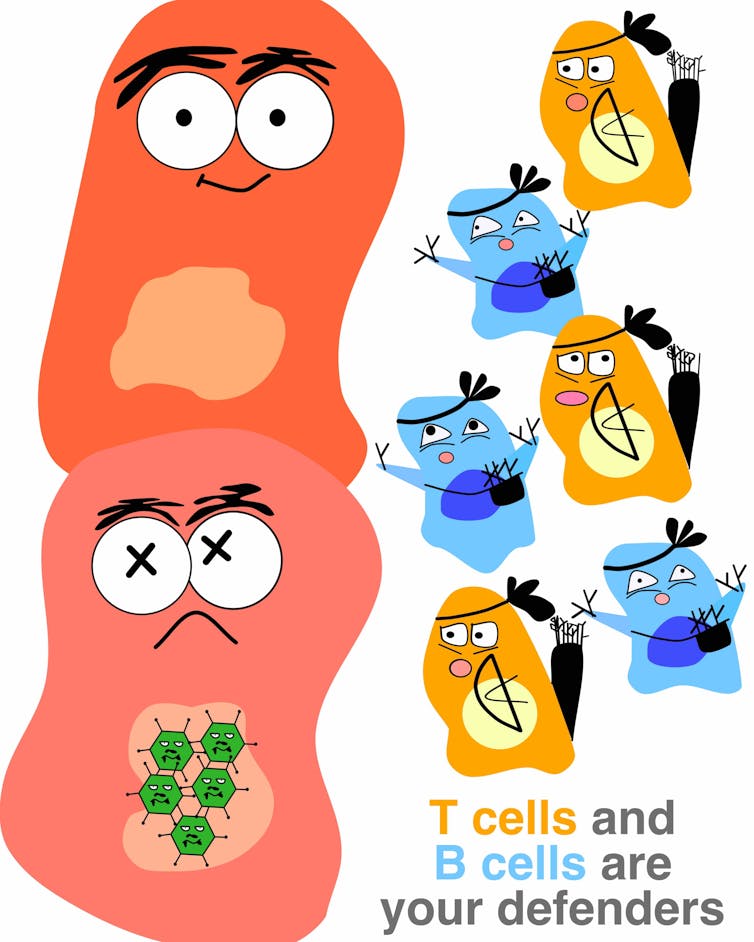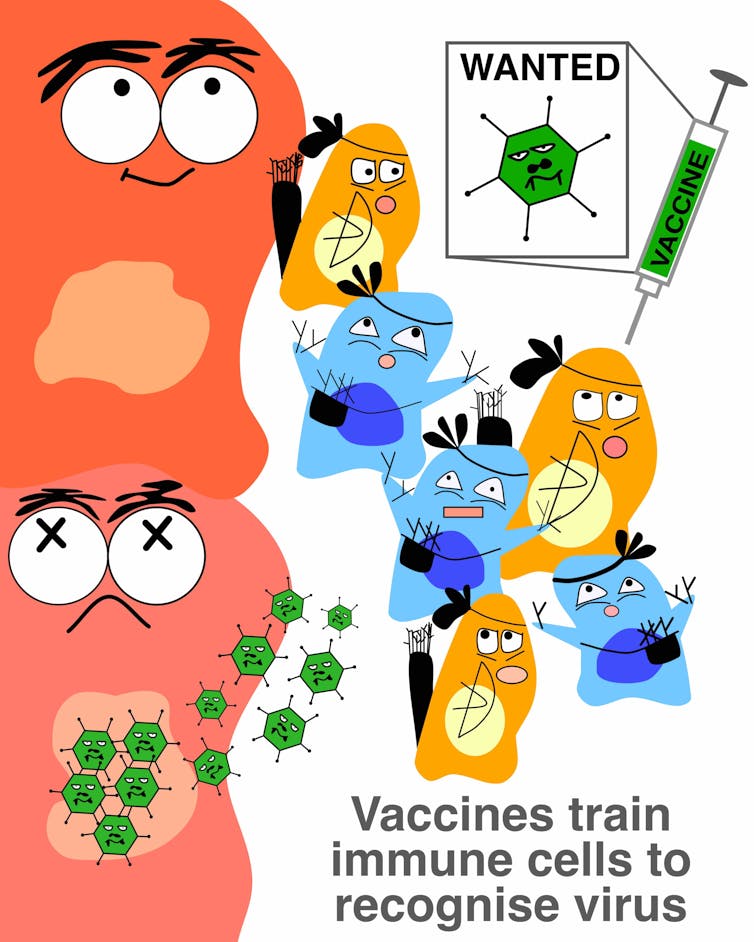Curious Kids: how do vaccines kill viruses?
- Written by Kylie Quinn, Vice-Chancellor's Research Fellow, School of Health and Biomedical Sciences, RMIT University
How are vaccines made to kill a virus? Layla, aged 7
Thanks Layla. This is a very important question, especially now, as scientists all around the world are working hard to develop a vaccine to protect us against the coronavirus. Actually, scientists are trying to find vaccines for many different diseases.
To understand how vaccines are made, we first need to understand how viruses make us sick, and how special cells in our bodies defend us against infections.
Read more: Curious Kids: what are cells made out of?
Viruses are pretty sneaky
Viruses make us sick when they invade our cells. The way this works is kind of complicated — us scientists have to study for many years to fully understand it. But you can think of it like this.
Viruses can get inside our cells by using a special key that fits into a lock on the outside of our cells. Once inside, the virus hijacks the cell, forcing it to make more virus by turning cells into tiny virus factories.
 Viruses use a special key to get inside our cells and start to make us sick.
Palak Mehta, Author provided
Viruses use a special key to get inside our cells and start to make us sick.
Palak Mehta, Author provided
This is stressful for our cells, which can make us start to feel sick. The virus made in the virus factories can spread the infection through our body, to make us even sicker.
It can also spread from our body to infect other people, and make them sick too.
Your immune system is your defence force
Your immune system is made up of immune cells — very special cells that live all throughout your body. Their job is to look out for any signs of an infection and defend all the other cells in your body when there is a threat.
There are many types of immune cells that work as a team to stop and even kill the virus. Two very important immune cells are B cells and T cells.
 Our immune cells — T cells and B cells — can defend us against viruses.
Palak Mehta, Author provided
Our immune cells — T cells and B cells — can defend us against viruses.
Palak Mehta, Author provided
B cells make a secret weapon called antibodies. Antibodies are tiny Y-shaped particles that are incredibly sticky — they stick all over the key on the virus so it no longer fits into the lock on our cells. This stops the virus from getting in and causing an infection.
If a virus does sneak past the B cells and get into our cells, T cells can deal with it — they are the ninjas of our immune system! They kill any cells that get infected to stop the virus from spreading within our body.
Our body comes across viruses — like the common cold, for example — every day, and they don’t always make us sick because our immune cells can protect us. But our immune cells are much better at their job if the virus is one they’ve seen before.
If we come across a new virus — like the coronavirus, for example — our immune cells can’t recognise it straight away. This gives the virus a chance to infect our cells and it can start to make us sick.
Read more: Curious Kids: how does our blood fight viruses like chicken pox and colds?
Vaccines teach our immune cells about the virus
All vaccines contain a little piece of the virus, which our immune cells pick up and start to show to each other. Our B cells and T cells can then recognise that little piece of virus and remember it, sometimes for years.
 Vaccines protect against viruses by teaching our immune cells what the virus looks like.
Palak Mehta, Author provided
Vaccines protect against viruses by teaching our immune cells what the virus looks like.
Palak Mehta, Author provided
The next time we see that virus, our immune cells recognise it straight away and kick into action.
If our immune cells can act quickly enough, we won’t get sick, and our bodies won’t make more virus that could make other people sick.
So, we hope that answers your question Layla. Your immune system is a powerful defence force — it protects you every day from infections. But sometimes it needs a little help from a vaccine, especially with a new virus it hasn’t seen before.
Hello, curious kids! Have you got a question you’d like an expert to answer? Ask an adult to send your question to curiouskids@theconversation.edu.au
Authors: Kylie Quinn, Vice-Chancellor's Research Fellow, School of Health and Biomedical Sciences, RMIT University
Read more https://theconversation.com/curious-kids-how-do-vaccines-kill-viruses-147266






